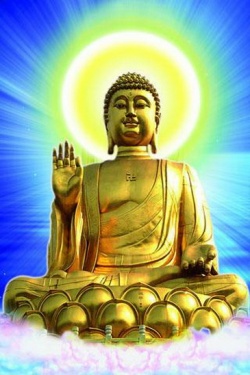Difference between revisions of "Tariki"
Jump to navigation
Jump to search
| Line 4: | Line 4: | ||
'''[[tariki]]''' | '''[[tariki]]''' | ||
| − | A [[Japanese]] [[Pure Land]] term derived from the {{Wiki|Chinese}} term t'a li meaning | + | A [[Japanese]] [[Pure Land]] term derived from the {{Wiki|Chinese}} term t'a li meaning ‘[[other-power]]’. This refers to the [[power]] of [[Amitābha]] [[Buddha]] that supports and [[empowers]] the [[Pure Land]] devotee's practice. In {{Wiki|Japanese}} [[Pure Land]] [[thought]], [[tariki]] came to be seen as the only effective [[power]] that could save the [[practitioner]]; ‘[[self-power]]’ ([[jiriki]]) was seen as [[arrogant]] and useless. |
{{R}} | {{R}} | ||
Revision as of 20:21, 22 March 2014
tariki; other power, outside help.
A Japanese Pure Land term derived from the Chinese term t'a li meaning ‘other-power’. This refers to the power of Amitābha Buddha that supports and empowers the Pure Land devotee's practice. In Japanese Pure Land thought, tariki came to be seen as the only effective power that could save the practitioner; ‘self-power’ (jiriki) was seen as arrogant and useless.
